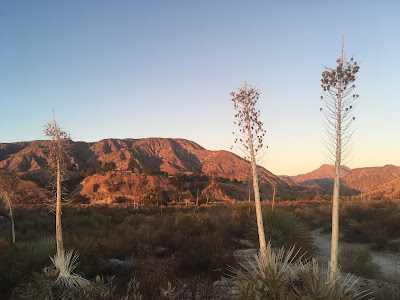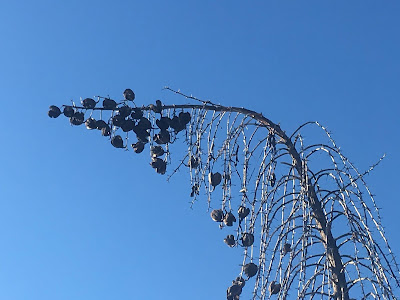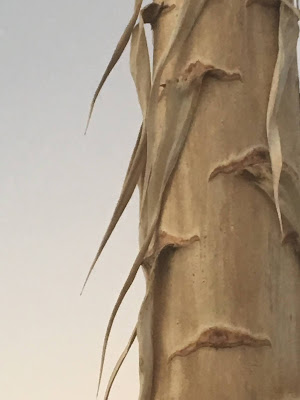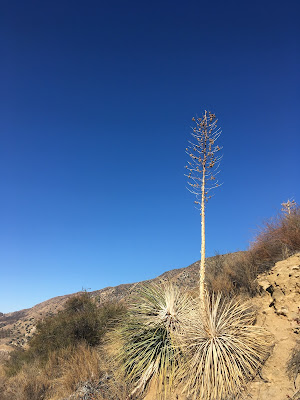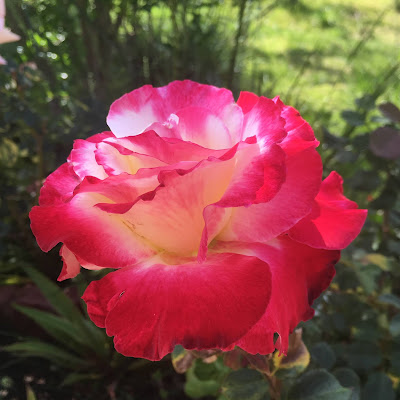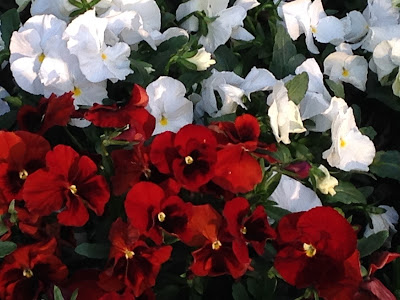What better place to live in than a garden, in the mountains, away from the bustle of the city? That's why the Paradise, Eden, was a garden - nature shaped, nurtured and cared for by people. My garden is my hermitage, my refuge, my "safe place" that we hear so much about everywhere these days. "Safe" - because I made it safe for all the winged and four-legged visitors, even two wild hares that hide under the rosemary bushes when not nibbling on the grass. Dozens of birds and lizards take care of insects, so I do not need to spray toxins on the living plants. Their green hues vary from jade to emerald, always reminding me that the "heart chakra" is green, for unconditional love is "green" and plants give all fauna nourishment and healing, not just the oxygen we need to breathe...
Here, Here, Here
I love my mountains —
blue and spring green still
under clear azure expanse.
Their velvet pleats pile up
in layers above the valley.
Rocky paths entwine
in empty riverbeds.
This is the Earth—naked
free of trees and houses, of rush
and pavement and cars on hot asphalt
in LA summers—this is
pure repose—serenely breathing
in the cycle of centuries.
I love my mountains—
bluish shadows on distant slopes,
manzanita and sage scattered
on those close by—they open
like curtains into infinity to let me in,
beyond the next peak, the next canyon,
into new worlds revealed under cool
glow of spiraling galaxies before dawn.
I found my life waiting for me
under the indigo cupola outlined
with deep purple at the ridges—
where crickets measure the night
as they sing "we are here, here, here..."
while birds sleep, hidden
among branches.
Only the distant waves of truck noise
from the freeway remind me
that this paradise of mine
this magic, fluid, living, folding
and unfolding is my LA home —
my own LA LA Land, sheltered
by spring mountains, blossoming
in mellow light of the kindest of Suns.
Our community lost a great person, a wonderful volunteer and kind, thoughtful, quiet, insightful friend. Halina Wojcik helped with the Polish Film Festival and cooked fantastic dishes. She was born in the village in Poland that was a couple of kilometers from my Grandma and Grandpa's village. So even in California we were neighbors...
Our Halina
~ Halina Wójcik in memoriam
She was quiet, she was nice,
too nice – not one to climb onto a pedestal
and scream “Look at me! Me, me, me — me!”
Hard to spot in a crowd, yet impossible to forget,
with the warmth of her open, glowing heart.
She was quiet, thoughtful, kind. You could
trust her words of wisdom, full of insight, charm.
She would tell you what you did not know
about yourself, all the good things she noticed
and you missed – stuck in the quicksand of
ambition, deluded by a mirage of false light.
Yes, attentive and discreet, she did not share
her observations, if the faults were harmless,
vices – plain ridiculous, without guile.
She was helpful, she was sweet – liked
to welcome guests at a Polish gala, cook
gourmet meals for strangers, friends.
She was calm, delightful, witty – loved
by all she laughed with – children, pets,
fancy ladies in high heels and pearls.
You could count on her when you felt –
feathers ruffled – out of place in your life.
With one word, she’d set you straight.
How is it that such calm, steady brightness
is not cherished more, when shining? Not until
it disappears in the shadows of long night?
Let’s remember her wry amusement
with life’s follies, skillful hands of kitchen magic,
lively sparkle in her smiling, ageless eyes!
Let’s all cheer our lovely angel –
Hali, Hali, Halina!
© February 2021 by Maja Trochimczyk
As president of California State Poetry Society, editor of California Quarterly and of the Poetry Letter, I get unsolicited books for review. I has a strange reaction to reading one of the submissions, and decided to put my thoughts into a poem, instead of a proper book review. It would not have been kind if I wrote that review, anyway.
On Reading Gail Wronsky in this Universe
Your blindness is self-inflicted, oh, teacher of generations,
hobbled by erudition – the blind leading the blind –
into the abyss – I’d like to say, but, no, just into a ditch
by the wayside, right next to the straight, white, sandy road
leading due East. As in Easter, or better still, the Sun Rising.
How not to see the world as dying, shrouded in a fog of sophistry?
You simply have to stop cursing. You only have to bless it. Your words
transmute the air you breathe, crystallize in your water.
Have you ever looked at the Sun, oh, poet of a thousand metaphors,
ten thousand accolades? Have you ever listened to that quiet voice,
wordlessly singing Hosanna? The Sun is Born. The Light so Bright.
The rays so full of little hands touching, caressing, smoothing out
each particle of matter twirling in its allotted space?
Yes, I know, you have your themes – Apocalypse, aging, loss,
despair, genitalia…Yes, I know, everything has its price.
But how can you be so blind? Oh, poet of poets, the blind
leading the blind – into the abyss, I’d like to say, but, no,
into a ditch by the wayside.
The path widens. Serene sages with sky-clear eyes
shine as lucid facets of endless, rotating crystal,
the living gem of our well-ordered Cosmos –
ruby, garnet, coral, amber, topaz, jade, emerald,
turquoise, sapphire, lapis-lazuli, amethyst and diamond
light streams swirl around the pilgrims, wrap them
in auroras of the sublime. Their rainbow bodies glow
golden-white – incandescent in morning sunshine.
Each one – a spark of the Divine, dressed in quarks
of the Divine Matter, for a test of the Divine Mind,
on an artery of the Divine Heart, along the ascending
road into the Divine Presence – all are jewels in the Divine
Crown – of the Here, of the Now, of We Are –
Reprinted from the "Poetry Letter" No. 2, 2021
It is quite a feat to write love poems while living alone, after two divorces, in an empty nest. It is a nest full of birds and sunlight, so it is a great site for an imaginary romance.
This Afternoon
You are the music while the music lasts.
~ T.S. Eliot, Little Gidding
The woodpecker measures time by the thickness
of tree trunks. Birds make nests, hidden from
hawks, safe from scrub jays. We wake in sunlight,
with twirling patterns still under our closed eyelids.
We listen to high-pitched calls of hummingbirds,
the random flutter of wings. We breathe in spring air
with smoothly flowing melodies of birdsong,
the sweetest of nectars. Waves crash on distant shores
of the Pacific. Stars appear dimly above the horizon,
that glows with the bronzed orange of departing Sun.
We live on the planet of children’s laughter.
We watch refractions of light in my sapphire ring,
on diamond dew drops that cling to blades of grass,
half-opened roses. We live on Earth of abundance
and beauty. We live on Earth of plenitude and calm.
There are no sorrows here, no worries.
No before, nor after. No plans. We take deep
breaths, count to eight, inhaling smiles to the tips
of our fingers, into our toes. I laugh. You laugh.
Crystalline peals echo through the Universe –
from galaxy to galaxy, star to star.
We grow and grow – infinite, gentler, wiser –
we understand all, embrace all, know all.
Perfection. Presence. Light.
(C) 2020 from Rose Always - A Love Story (rev. 2020)
